18 dec 2018
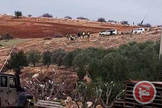
Israeli forces uprooted hundreds of cactus seedlings belonging to a Palestinian resident in the Bardala village in the northern occupied West Bank, on Tuesday afternoon.
A Palestinian official in charge of Jordan Valley's Israeli settlements file at the Palestinian Authority (PA), Mutaz Bisharat, said that Israeli forces uprooted 200 five-month-old cactus seedlings.
Bisharat added that the seedlings belong to local resident Faris Sawafta in Bardala in the Jordan Valley.
Forming a third of the occupied West Bank and with 88 percent of its land classified as Area C, the Jordan Valley has long been a strategic area of land unlikely to return to Palestinians following Israel's occupation in 1967.
The unpredictability of the training drills leaves rural Palestinian communities in the Jordan Valley anxious about when they will be displaced, and whether the next time will be permanent.
Palestinian residents of the Jordan Valley regularly face evacuations and interruption due to Israeli military exercises on or near their land. The Jordan Valley district of Tubas is one of the West Bank's most important agricultural centers.
The majority of the Jordan Valley is under full Israeli military control, while at least 44% of the total land in the Jordan Valley has been re-appropriated by Israeli forces for military purposes and training exercises.
According to the Palestinian nonprofit the Applied Research Institute - Jerusalem (ARIJ), using data from the Palestine Ministry of Wall and Colonization Affairs, the group reported that more than 400,000 dunams (98,842 acres) of the 720,000 dunams (177,916 acres) that make up the total area of the Jordan Valley has been transformed into closed military and firing zones, with at least 27,000 dunams (6,672 acres) confiscated for illegal Israeli settlement building.
Palestinians in the Jordan Valley are one of the most vulnerable groups to displacement, with over 60 percent of the 6,000 Palestinians forcibly displaced since 2008 belonged to herding or Bedouin communities, according to the Office for the Coordination of Humanitarian Affairs (OCHA).
A Palestinian official in charge of Jordan Valley's Israeli settlements file at the Palestinian Authority (PA), Mutaz Bisharat, said that Israeli forces uprooted 200 five-month-old cactus seedlings.
Bisharat added that the seedlings belong to local resident Faris Sawafta in Bardala in the Jordan Valley.
Forming a third of the occupied West Bank and with 88 percent of its land classified as Area C, the Jordan Valley has long been a strategic area of land unlikely to return to Palestinians following Israel's occupation in 1967.
The unpredictability of the training drills leaves rural Palestinian communities in the Jordan Valley anxious about when they will be displaced, and whether the next time will be permanent.
Palestinian residents of the Jordan Valley regularly face evacuations and interruption due to Israeli military exercises on or near their land. The Jordan Valley district of Tubas is one of the West Bank's most important agricultural centers.
The majority of the Jordan Valley is under full Israeli military control, while at least 44% of the total land in the Jordan Valley has been re-appropriated by Israeli forces for military purposes and training exercises.
According to the Palestinian nonprofit the Applied Research Institute - Jerusalem (ARIJ), using data from the Palestine Ministry of Wall and Colonization Affairs, the group reported that more than 400,000 dunams (98,842 acres) of the 720,000 dunams (177,916 acres) that make up the total area of the Jordan Valley has been transformed into closed military and firing zones, with at least 27,000 dunams (6,672 acres) confiscated for illegal Israeli settlement building.
Palestinians in the Jordan Valley are one of the most vulnerable groups to displacement, with over 60 percent of the 6,000 Palestinians forcibly displaced since 2008 belonged to herding or Bedouin communities, according to the Office for the Coordination of Humanitarian Affairs (OCHA).
17 dec 2018

Israeli settlers chopped up on Sunday over 160 olive trees in Palestinian lands in the villages of al-Mugheir and Tarmas’iya, in Ramallah province, in the central occupied West Bank.
Activist Kasem al-Haj Mohamed said Israelis residing in the illegal settlement of Eli Ad uprooted 160 olive trees in al-Mugheir village, northeast of Ramallah, and 100 seedlings in Tarmas’iya, to the north, that belong to Palestinian citizens Jamil al-Naasan and Salim Abu Abdullah.
The activist said settlers from the aforementioned outpost have stepped up attacks against Palestinian land and property in the area.
Activist Kasem al-Haj Mohamed said Israelis residing in the illegal settlement of Eli Ad uprooted 160 olive trees in al-Mugheir village, northeast of Ramallah, and 100 seedlings in Tarmas’iya, to the north, that belong to Palestinian citizens Jamil al-Naasan and Salim Abu Abdullah.
The activist said settlers from the aforementioned outpost have stepped up attacks against Palestinian land and property in the area.
15 dec 2018
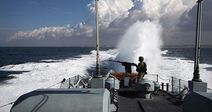
The Israeli occupation navy on Saturday morning kidnapped two Palestinian fishermen during their presence off the coast of Gaza City.
Chief of the fishermen Nizar Ayyash told Quds Press that the brothers, Mohamed and Atef Abu Riyala, were kidnapped after Israeli naval forces opened machinegun fire near their fishing boat, which was also confiscated.
Ayyash added that the fishermen were working within four nautical miles from the shore of Gaza City.
Meanwhile, Israeli soldiers opened fire at a group of Palestinian citizens in a border area to the east of Khan Younis in southern Gaza, with no reported injuries.
Chief of the fishermen Nizar Ayyash told Quds Press that the brothers, Mohamed and Atef Abu Riyala, were kidnapped after Israeli naval forces opened machinegun fire near their fishing boat, which was also confiscated.
Ayyash added that the fishermen were working within four nautical miles from the shore of Gaza City.
Meanwhile, Israeli soldiers opened fire at a group of Palestinian citizens in a border area to the east of Khan Younis in southern Gaza, with no reported injuries.
13 dec 2018
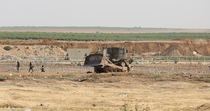
The Israeli occupation army rolled on Thursday morning dozens of meters into the besieged Gaza Strip and attacked farmers south of the enclave.
Local sources said four Israeli military bulldozers moved into the northern borders of Beit Lahia, north of Gaza Strip, and leveled Palestinian lands in the area.
The Israeli army opened fire at Palestinian farmers in Absan al-Jadida, east of Khan Younis, south of the besieged Gaza Strip.
Local sources said four Israeli military bulldozers moved into the northern borders of Beit Lahia, north of Gaza Strip, and leveled Palestinian lands in the area.
The Israeli army opened fire at Palestinian farmers in Absan al-Jadida, east of Khan Younis, south of the besieged Gaza Strip.
12 dec 2018
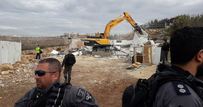
The Israeli municipal authority in Occupied Jerusalem on Wednesday morning bulldozed Palestinian facilities in Beit Hanina town, northeast of the holy city.
Eyewitnesses reported that bulldozers escorted by an Israeli municipal crew and police forces stormed the Palestinian town of Beit Hanina and carried out demolitions.
According to Quds Press, the bulldozers knocked down a parking space and a commercial store belonging to a Palestinian citizen identified as Anwar Dawla. video
The Israeli municipality in Jerusalem targets every Palestinian citizen who build or expand a house or any facility in the holy city and its environs at the pretext of unlicensed construction.
However, the Jerusalemites are not given construction permits to build or expand their properties by the Israeli municipality, which instead promotes and support settlement and Judaization projects in Jerusalem.
Eyewitnesses reported that bulldozers escorted by an Israeli municipal crew and police forces stormed the Palestinian town of Beit Hanina and carried out demolitions.
According to Quds Press, the bulldozers knocked down a parking space and a commercial store belonging to a Palestinian citizen identified as Anwar Dawla. video
The Israeli municipality in Jerusalem targets every Palestinian citizen who build or expand a house or any facility in the holy city and its environs at the pretext of unlicensed construction.
However, the Jerusalemites are not given construction permits to build or expand their properties by the Israeli municipality, which instead promotes and support settlement and Judaization projects in Jerusalem.
10 dec 2018

The Israeli occupation forces (IOF) on Monday arrested a Palestinian merchant from Gaza while he was passing through Beit Hanoun (Erez) crossing, north of the Gaza Strip.
A human rights source reported that the IOF arrested Aref Shumar as he was travelling through Beit Hanoun crossing.
16 merchants have been arrested at the crossing since the beginning of the year, the source pointed out.
Israeli forces allow only Palestinians who have special permits to travel through Beit Hanoun crossing, and sometimes they get arbitrarily arrested or interrogated.
A human rights source reported that the IOF arrested Aref Shumar as he was travelling through Beit Hanoun crossing.
16 merchants have been arrested at the crossing since the beginning of the year, the source pointed out.
Israeli forces allow only Palestinians who have special permits to travel through Beit Hanoun crossing, and sometimes they get arbitrarily arrested or interrogated.
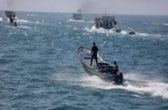
Israeli navy ships attacked, Monday, Palestinian fishing boats in Gaza territorial waters, near Rafah, in the southern part of the coastal region, and abducted two fishermen.
Media sources in Gaza said the soldiers fired many live rounds at the boats, and used water cannons, while the fishermen were only four nautical miles from the shore.
They added that the navy then abducted two young fishermen, identified as Nasser Ahmad an-Nada, 24, and Mohammad Jassem Saidam, 20, and confiscated their boat.
The attack is part of ongoing violations against the Palestinians in the besieged and improvised Gaza Strip.
Suck attacks frequently target fishermen, in addition to farmers and workers on lands close to the perimeter fence.
Many Palestinians fishermen, farmers and workers have been killed, hundreds injured and abducted by the navy and the soldiers.
Last month, the navy killed a Palestinian fisherman, identified as Nawwaf Ahmad al-Attar, 20, in Gaza waters, west of Beit Lahia, in the northern part of the coastal region.
In early October of this year, the Israeli army shot and killed an elderly Palestinian farmer, identified as Ibrahim Ahmad al-Arrouqi, 78, in the central part of the Gaza Strip, while he was working on his land.
Media sources in Gaza said the soldiers fired many live rounds at the boats, and used water cannons, while the fishermen were only four nautical miles from the shore.
They added that the navy then abducted two young fishermen, identified as Nasser Ahmad an-Nada, 24, and Mohammad Jassem Saidam, 20, and confiscated their boat.
The attack is part of ongoing violations against the Palestinians in the besieged and improvised Gaza Strip.
Suck attacks frequently target fishermen, in addition to farmers and workers on lands close to the perimeter fence.
Many Palestinians fishermen, farmers and workers have been killed, hundreds injured and abducted by the navy and the soldiers.
Last month, the navy killed a Palestinian fisherman, identified as Nawwaf Ahmad al-Attar, 20, in Gaza waters, west of Beit Lahia, in the northern part of the coastal region.
In early October of this year, the Israeli army shot and killed an elderly Palestinian farmer, identified as Ibrahim Ahmad al-Arrouqi, 78, in the central part of the Gaza Strip, while he was working on his land.
9 dec 2018

With tears filling his eyes, the Palestinian farmer Mansour Marayta pointed to his farmland in Marda village, in Salfit, which has been turned into Israeli buildings, laboratories, apartments, parks, and bypass roads.
The 78-year-old man could not stop them from taking his land, the home of his childhood memories, although he has the documents that prove his ownership of the stolen property.
Memories
Marayta said that the Israeli authorities seized over 20 dunums of land that once belonged to his family in favor of the construction of Ariel settlement and its university.
Remembering the old days, Marayta said, "We used to start work in our farmland at daybreak, enjoying the fresh air and the morning songs of birds. We were happy. We were able to enter our land and leave whenever we wanted. All this is now gone."
"Our days were better and more beautiful before the settlement. The occupation came and turned our life upside down. Joy and happiness became misery and humiliation," he added.
Against the law
"Despite the challenges," Haj Mansour continued, "We will defend our lands until the last breath. The land means everything to us: life, livelihood, future and home. No matter how long the occupation lasts, it will eventually come to an end."
Anti-settlement researcher Khaled Ma'ali said that Israel's confiscation of Marayta's land in favor of settlement construction violates international law, which bans the occupying power from building on the lands it occupies.
Ma'ali pointed out that Ariel settlement's university was built on lands privately owned by poor Palestinian farmers from the villages and towns of Salfit, Marda, Iskaka, Yasuf, Jamain, Qira, and Kifl Hares.
He added that Israel took advantage of the world's respect and appreciation for knowledge and science, and, expecting no opposition, it built Ariel university, the only university for Israeli settlers in the West Bank.
The 78-year-old man could not stop them from taking his land, the home of his childhood memories, although he has the documents that prove his ownership of the stolen property.
Memories
Marayta said that the Israeli authorities seized over 20 dunums of land that once belonged to his family in favor of the construction of Ariel settlement and its university.
Remembering the old days, Marayta said, "We used to start work in our farmland at daybreak, enjoying the fresh air and the morning songs of birds. We were happy. We were able to enter our land and leave whenever we wanted. All this is now gone."
"Our days were better and more beautiful before the settlement. The occupation came and turned our life upside down. Joy and happiness became misery and humiliation," he added.
Against the law
"Despite the challenges," Haj Mansour continued, "We will defend our lands until the last breath. The land means everything to us: life, livelihood, future and home. No matter how long the occupation lasts, it will eventually come to an end."
Anti-settlement researcher Khaled Ma'ali said that Israel's confiscation of Marayta's land in favor of settlement construction violates international law, which bans the occupying power from building on the lands it occupies.
Ma'ali pointed out that Ariel settlement's university was built on lands privately owned by poor Palestinian farmers from the villages and towns of Salfit, Marda, Iskaka, Yasuf, Jamain, Qira, and Kifl Hares.
He added that Israel took advantage of the world's respect and appreciation for knowledge and science, and, expecting no opposition, it built Ariel university, the only university for Israeli settlers in the West Bank.
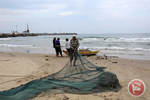
Israeli naval forces opened fire towards Palestinian fishermen, west of Rafah City and Khan Younis City, in the southern besieged Gaza Strip, on Sunday.
A Ma'an reporter said that Israeli naval forces repeatedly opened fire at fishermen within the permitted fishing zone, forcing them back to shore.
Meanwhile, Israeli forces stationed at the Kissufim military site, east of the al-Qarrara town in southern Gaza, opened fire at Palestinian shepherds, while working in their lands.
No injuries were reported from both incidents.
The reason for both shootings remained unknown.
Israeli military incursions inside the besieged Gaza Strip and near the "buffer zone," which lies on both land and sea sides of Gaza, have long been a near-daily occurrence.
The Israeli army also regularly detains and opens fire on unarmed Palestinian fishermen, shepherds, and farmers along the border areas if they approach the buffer zone, as the authorities have not made clear the precise area of the designated zone.
The practice has in effect destroyed much of the agricultural and fishing sector of the blockaded coastal enclave, which has been under an Israeli air, land and sea blockade for nearly 12 years.
A Ma'an reporter said that Israeli naval forces repeatedly opened fire at fishermen within the permitted fishing zone, forcing them back to shore.
Meanwhile, Israeli forces stationed at the Kissufim military site, east of the al-Qarrara town in southern Gaza, opened fire at Palestinian shepherds, while working in their lands.
No injuries were reported from both incidents.
The reason for both shootings remained unknown.
Israeli military incursions inside the besieged Gaza Strip and near the "buffer zone," which lies on both land and sea sides of Gaza, have long been a near-daily occurrence.
The Israeli army also regularly detains and opens fire on unarmed Palestinian fishermen, shepherds, and farmers along the border areas if they approach the buffer zone, as the authorities have not made clear the precise area of the designated zone.
The practice has in effect destroyed much of the agricultural and fishing sector of the blockaded coastal enclave, which has been under an Israeli air, land and sea blockade for nearly 12 years.
Page: 44 - 43 - 42 - 41 - 40 - 39 - 38 - 37 - 36 - 35 - 34 - 33 - 32 - 31 - 30 - 29 - 28 - 27 - 26 - 25 - 24 - 23
